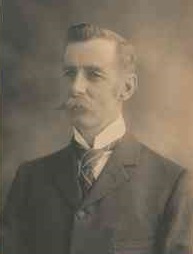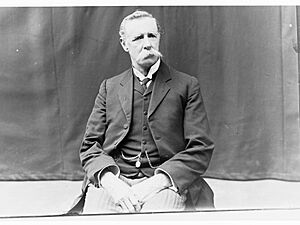Richard Butler (Australian politician) facts for kids
Quick facts for kids
Sir Richard Butler
|
|
|---|---|
 |
|
| 23rd Premier of South Australia | |
| In office 1 March 1905 – 26 July 1905 |
|
| Monarch | Edward VII |
| Governor | Sir George Le Hunte |
| Preceded by | John Jenkins |
| Succeeded by | Thomas Price |
| 13th Leader of the Opposition (SA) | |
| In office 1905–1909 |
|
| Preceded by | Thomas Price |
| Succeeded by | John Verran |
| Personal details | |
| Born | 3 December 1850 Stadhampton, England, UK |
| Died | 28 April 1925 (aged 74) South Croydon, England, UK |
| Political party | Conservative |
Sir Richard Butler (born 3 December 1850 – died 28 April 1925) was an important Australian politician. He was a member of the South Australian House of Assembly, which is like a state parliament, for 34 years. He represented the areas of Yatala (1890–1902) and Barossa (1902–1924).
Sir Richard Butler even served as the Premier of South Australia, which is like the state's leader, for a short time in 1905. He was also the Leader of the Opposition from 1905 to 1909. Later, he became the Speaker of the House of Assembly from 1921 to 1924. His son, Richard Layton Butler, also became Premier of South Australia many years later.
Contents
Early Life and Education
Richard Butler was born in Stadhampton, a small town near Oxford, England. His parents were Richard Butler père and Mary Eliza Sadler. In 1854, when Richard was just three years old, his family moved to South Australia.
They followed Richard's uncle, Philip, who had moved to Australia earlier. Philip had become very successful as a farmer and landowner. He owned a large sheep farm called "Mallala" and a property called "Yattalunga" near Gawler.
When Philip returned to England, Richard's father took over managing these properties. Richard grew up on these farms. He went to school at St Peter's College, Adelaide, which is a well-known school. After finishing school, he worked as a farmer and grazier (someone who raises livestock). He became a Justice of the Peace before he turned 30.
Richard Butler's Political Journey
Richard Butler first tried to become a politician in 1890. He ran for the area of Yatala but did not win that time. However, a few months later, he won the seat in a special election. This happened after the previous member, James Cowan, passed away.
In 1898, he became the Minister of Agriculture in the government led by Premier Charles Kingston. This was his first big role in government.
In 1902, the Yatala area was changed, so Butler then represented the Barossa area until 1924. He became a leader for a group of politicians from country areas in 1904.
Serving as Treasurer and Premier
From 1901 to 1905, Butler served as the Treasurer, managing the state's money. He was also in charge of Crown Lands and Immigration.
When Premier John Jenkins left to work in London, Richard Butler took over as Premier in March 1905. He continued to manage the state's money and lands. However, his government was defeated after the 1905 election. The Labor Party then formed a new government.
Roles in Later Governments
After being Premier, Butler became the Leader of the Opposition until 1909. He later joined the government of Archibald Peake in December 1909, again as Treasurer. He also became the Minister for the Northern Territory. This government did not last long, as it was defeated after the 1910 election.
Butler continued to serve in different government roles. From 1912 to 1914, he was the Commissioner of Public Works. He was also the Minister of Mines and Marine from 1912 to 1915.
Challenges and Recognition
In 1917, Butler became Treasurer and Minister of Railways again in Peake's third government. He also served as Minister of Agriculture.
Later, there was a report about a wheat program he was involved with. This report led to some disagreements, and Premier Peake asked Butler to resign. Butler did not want to resign because he felt he had done nothing wrong. Because he refused, the government removed him from his positions.
However, a later report, about 14 months later, helped clear his name. The fact that he was chosen as Speaker of the South Australian House of Assembly in 1921 shows that people believed he was treated unfairly. He lost his seat in the 1924 election, ending his 34 years in parliament.
Later Life and Family Legacy
In early 1925, Sir Richard Butler traveled to England. He passed away in South Croydon, England, on 28 April 1925.
He was honored with the title of knight bachelor in 1913, which means he was given the title "Sir." He was married twice, first to Helena Kate Layton and then to Ethel Pauline Finer. He had eleven children in total from both marriages.
His son, Richard Layton Butler, followed in his footsteps and became Premier of South Australia twice (from 1927–1930 and 1933–1938). His great-grandson, Mark Butler, is also a politician and a member of the Australian House of Representatives for the Labor Party.
Images for kids
See also
- Hundred of Butler



